疑问句
- 格式:doc
- 大小:78.00 KB
- 文档页数:8
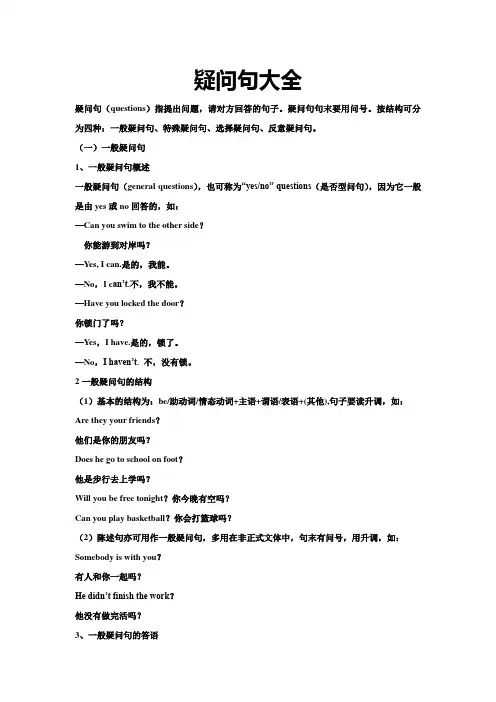
疑问句大全疑问句(questions)指提出问题,请对方回答的句子。
疑问句句末要用问号。
按结构可分为四种:一般疑问句、特殊疑问句、选择疑问句、反意疑问句。
(一)一般疑问句1、一般疑问句概述一般疑问句(general questions),也可称为“yes/no” questions(是否型问句),因为它一般是由yes或no回答的,如:—Can you swim to the other side?你能游到对岸吗?—Yes, I can.是的,我能。
—No,I c an’t.不,我不能。
—Have you locked the door?你锁门了吗?—Yes,I have.是的,锁了。
—No,I haven’t. 不,没有锁。
2一般疑问句的结构(1)基本的结构为:be/助动词/情态动词+主语+谓语/表语+(其他),句子要读升调,如:Are they your friends?他们是你的朋友吗?Does he go to school on foot?他是步行去上学吗?Will you be free tonight?你今晚有空吗?Can you play basketball?你会打篮球吗?(2)陈述句亦可用作一般疑问句,多用在非正式文体中,句末有问号,用升调,如:Somebody is with you?有人和你一起吗?He didn’t finish the work?他没有做完活吗?3、一般疑问句的答语(1)一般疑问句一般由yes或no来回答,如:—Are you tired?你累了吗?—Yes,I am.是的,累了。
—No, I’m not.不,不累。
—Does she do the cleaning?她扫除了吗?—Yes ,she does.是的,她打扫了。
—No,she doesn’t.不,她没打扫。
2)回答一般疑问句除了用yes或no外,也可用certainly,probably,perhaps,of course,all right,with pleasure等代替yes,用never,not at all等代替no,如:—Can you help me?你能帮个忙吗?—Certainly.当然。
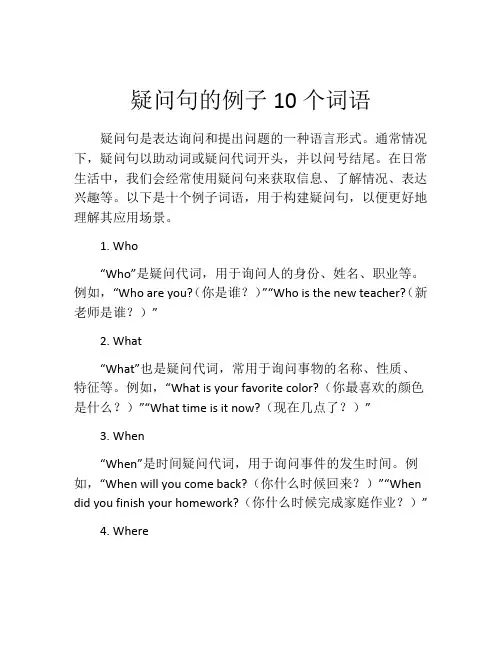
疑问句的例子10个词语疑问句是表达询问和提出问题的一种语言形式。
通常情况下,疑问句以助动词或疑问代词开头,并以问号结尾。
在日常生活中,我们会经常使用疑问句来获取信息、了解情况、表达兴趣等。
以下是十个例子词语,用于构建疑问句,以便更好地理解其应用场景。
1. Who“Who”是疑问代词,用于询问人的身份、姓名、职业等。
例如,“Who are you?(你是谁?)”“Who is the new teacher?(新老师是谁?)”2. What“What”也是疑问代词,常用于询问事物的名称、性质、特征等。
例如,“What is your favorite color?(你最喜欢的颜色是什么?)”“What time is it now?(现在几点了?)”3. When“When”是时间疑问代词,用于询问事件的发生时间。
例如,“When will you come back?(你什么时候回来?)”“When did you finish your homework?(你什么时候完成家庭作业?)”4. Where“Where”是地点疑问代词,用于询问事件或物品的位置。
例如,“Where do you live?(你住在哪里?)”“Where is the nearest hospital?(最近的医院在哪里?)”5. Why“Why”是原因疑问代词,用于询问事件或事情的原因。
例如,“Why are you so sad?(你为什么这么伤心?)”“Why did you choose this job?(你为什么选择这个职业?)”6. How“How”是方式疑问代词,用于询问某事的方法、过程或手段。
例如,“How can I get to the airport?(我怎么去机场?)”“How did you learn to play the piano?(你怎么学会弹钢琴的?)”7. Which“Which”也是疑问代词,用于询问特定的事物或选项。
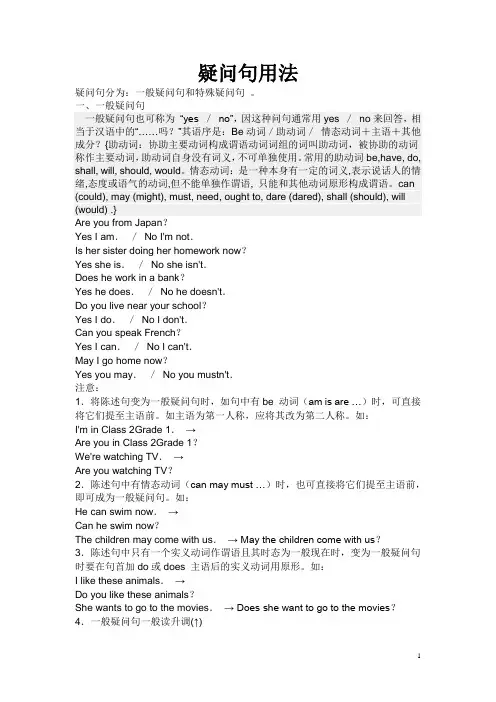
疑问句用法疑问句分为:一般疑问句和特殊疑问句。
一、一般疑问句一般疑问句也可称为“yes /no”,因这种问句通常用yes /no来回答,相当于汉语中的“……吗?”其语序是:Be动词/助动词/情态动词+主语+其他成分?{助动词:协助主要动词构成谓语动词词组的词叫助动词,被协助的动词称作主要动词,助动词自身没有词义,不可单独使用。
常用的助动词be,have, do, shall, will, should, would。
情态动词:是一种本身有一定的词义,表示说话人的情绪,态度或语气的动词,但不能单独作谓语, 只能和其他动词原形构成谓语。
can (could), may (might), must, need, ought to, dare (dared), shall (should), will (would) .}Are you from Japan?Yes I am./No I'm not.Is her sister doing her homework now?Yes she is./No she isn't.Does he work in a bank?Yes he does./No he doesn't.Do you live near your school?Yes I do./No I don't.Can you speak French?Yes I can./No I can't.May I go home now?Yes you may./No you mustn't.注意:1.将陈述句变为一般疑问句时,如句中有be 动词(am is are …)时,可直接将它们提至主语前。
如主语为第一人称,应将其改为第二人称。
如:I'm in Class 2Grade 1.→Are you in Class 2Grade 1?We're watching TV.→Are you watching TV?2.陈述句中有情态动词(can may must …)时,也可直接将它们提至主语前,即可成为一般疑问句。
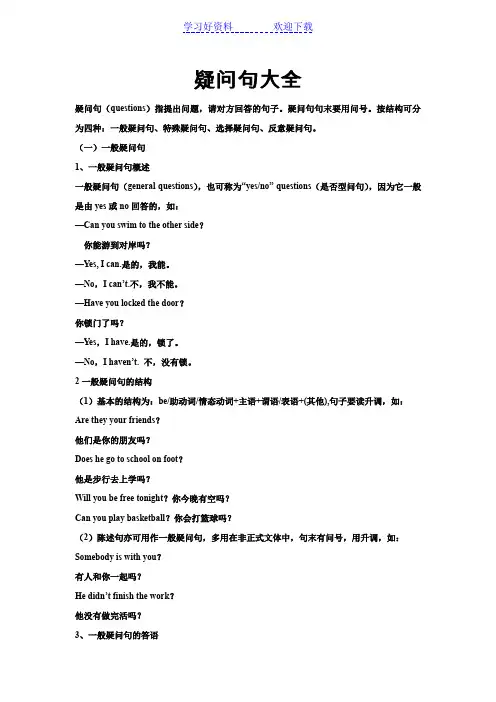
疑问句大全疑问句(questions)指提出问题,请对方回答的句子。
疑问句句末要用问号。
按结构可分为四种:一般疑问句、特殊疑问句、选择疑问句、反意疑问句。
(一)一般疑问句1、一般疑问句概述一般疑问句(general questions),也可称为“yes/no” questions(是否型问句),因为它一般是由yes或no回答的,如:—Can you swim to the other side?你能游到对岸吗?—Yes, I can.是的,我能。
—No,I c an’t.不,我不能。
—Have you locked the door?你锁门了吗?—Yes,I have.是的,锁了。
—No,I haven’t. 不,没有锁。
2一般疑问句的结构(1)基本的结构为:be/助动词/情态动词+主语+谓语/表语+(其他),句子要读升调,如:Are they your friends?他们是你的朋友吗?Does he go to school on foot?他是步行去上学吗?Will you be free tonight?你今晚有空吗?Can you play basketball?你会打篮球吗?(2)陈述句亦可用作一般疑问句,多用在非正式文体中,句末有问号,用升调,如:Somebody is with you?有人和你一起吗?He didn’t finish the work?他没有做完活吗?3、一般疑问句的答语(1)一般疑问句一般由yes或no来回答,如:—Are you tired?你累了吗?—Yes,I am.是的,累了。
—No, I’m not.不,不累。
—Does she do the cleaning?她扫除了吗?—Yes ,she does.是的,她打扫了。
—No,she doesn’t.不,她没打扫。
2)回答一般疑问句除了用yes或no外,也可用certainly,probably,perhaps,of course,all right,with pleasure等代替yes,用never,not at all等代替no,如:—Can you help me?你能帮个忙吗?—Certainly.当然。
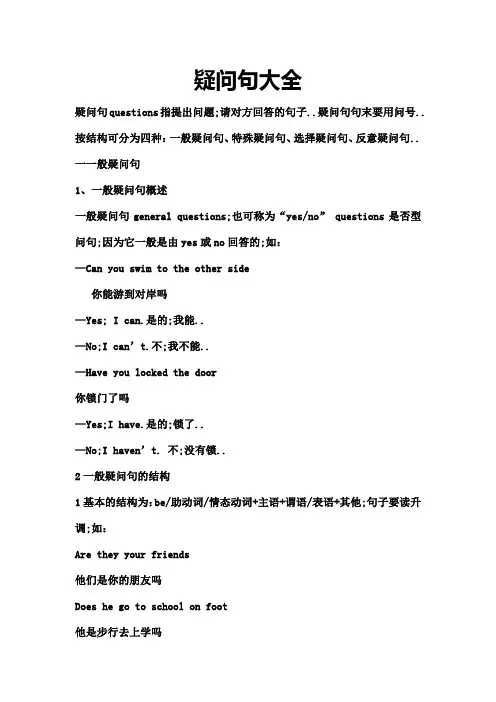
疑问句大全疑问句questions指提出问题;请对方回答的句子..疑问句句末要用问号..按结构可分为四种:一般疑问句、特殊疑问句、选择疑问句、反意疑问句.. 一一般疑问句1、一般疑问句概述一般疑问句general questions;也可称为“yes/no” questions是否型问句;因为它一般是由yes或no回答的;如:—Can you swim to the other side你能游到对岸吗—Yes; I can.是的;我能..—No;I can’t.不;我不能..—Have you locked the door你锁门了吗—Yes;I have.是的;锁了..—No;I haven’t. 不;没有锁..2一般疑问句的结构1基本的结构为:be/助动词/情态动词+主语+谓语/表语+其他;句子要读升调;如:Are they your friends他们是你的朋友吗Does he go to school on foot他是步行去上学吗Will you be free tonight你今晚有空吗Can you play basketball你会打篮球吗2陈述句亦可用作一般疑问句;多用在非正式文体中;句末有问号;用升调;如:Somebody is with you有人和你一起吗He didn’t finish the work他没有做完活吗3、一般疑问句的答语1一般疑问句一般由yes或no来回答;如:—Are you tired你累了吗—Yes;I am.是的;累了..—No; I’m not.不;不累..—Does she do the cleaning她扫除了吗—Yes ;she does.是的;她打扫了..—No;she doesn’t.不;她没打扫..2回答一般疑问句除了用yes或no外;也可用certainly;probably;perhaps;of course;all right;with pleasure等代替yes;用never;not at all等代替no;如:—Can you help me你能帮个忙吗—Certainly.当然..—Could you please make less noise你可以小声一点吗—All right;sir.好的;先生..—Have you been there你到过那里吗—Never.从来没有..4、一般疑问句的否定式1一般疑问句的否定式;一般结构为系动词/助动词/情态动词+not+主语;也可为系动词/助动词/情态动词+主语+not;如:Do you not/Don’t you believe me 你不相信我Believe me你不相信我Is it not / Isn’t it a lovely day 天气难道不好吗Are you not / Aren’t you coming 你不来吗Will you not /Won’t you sit down 你不坐会儿吗Is he not / Isn’t he a doctor 他不是医生吗2否定疑问句并不单纯表示提问;它常常带有感情色彩..否定疑问句的完全式比简略式所表达的语气更强烈些..3否定的一般疑问句的答语中;yes的含义为“不”;no的含义为“是”;但在回答这类句子时;应该注意yes后接肯定结构;no后接否定结构;这和汉语习惯不同;如:—Are you not Mr Smith你不是史密斯先生吗—Yes;I am.不;我是..—No;I am not.是的;我不是..—Haven’t you read this book before你从前没有读过这本书吗—Yes;I have.不;我读过..—No;I haven’t.是的;我没有..—Don’t you play chess你不下棋吗—Yes ;I do.不;我下棋..—No;I don’t.是的;我不下棋..教你一招:在这样的答语中;只要根据实际情况来判断;如果事实上是;就要用yes;如果事实上不是;就要用no..二特殊疑问句1、特殊疑问句概述特殊疑问句special questions;也可称为“wh”-questions;因为它们多数都以who;where;when;which;whose;why这类词开头;如:Who is it on the phone谁来的电话How many oranges can you see in the picture你能在图画上看到多少个橘子Where did you last see it你最后一次看到这东西时是在什么地方呢What did you eat yesterday你昨天吃了些什么How do you usually go to school你通常是怎么去学校的呢2、特殊疑问句的构成及用法1它的结构一般为:特殊疑问词+一般疑问句;即:特殊疑问词+be/助动词/情态动词+主语+谓语/表语+其他;如:What can be done about it对此能做些什么呢Which are yours哪些是你的Who would like to come for a game of football谁愿意来踢场足球呀What did you say你说什么Why didn’t you tell me你为什么没有告诉我3“why+一般疑问句否定式”这种结构一般表示劲告、建议、责备等;而不能归为特殊问句;如:Why don’t you come earlier你为什么不早些来呢Why not go skiing为何不去滑雪呢3、特殊疑问词特殊疑问词可分为两类:疑问代词和疑问副词1疑问代词疑问代词主要有五个;分别为:who;whom;which;what;whose..它们没有性和数的变化;除了who外也没有格的变化..Who is the girl under the treeWho is not hereWhom谁作宾语;用来指人Whom are you writing toWhom do you want to seeWhose谁的用来指所属关系;如果作定语;一般后接名词Whose pen is thisWhose are those shoesWhich哪个;哪些用来指对人或物在一定范围之内进行选择Which girls will be in the sports meetingWhich hat is lily’sWhat通常指物;也可指人;一般用在没有指出范围的情况下What can you see in the pictureWhat is in the teacher’s room2疑问副词疑问副词包括when;where;why;how及how与其他副词和形容词组成的疑问词..疑问副词when何时询问时间When will she returnWhere何地询问地点Where do you come fromWhy为什么询问原因Why are you late for schoolHow如何询问手段、方式、工具以及程度等How do you usually go to schoolHow old多大询问年龄How old is Jim’s little brotherHow much/many多少询问数量How many friends do you haveHow far多远询问距离How far is it from your home to school How long多长、多久询问时间的长度或距离How long will you stay in BeijingHow often多长时间一次询问频率How often do you go to see your grandparentsHow soon多久询问时间How soon will you come back4、特殊疑问句的答语特殊疑问句的答语的重点是对疑问词的回答非所问;因此;不再需要用yes 或no..在回答时;可以用一个词或词组;也可以用一个较为完整的句子..Who has borrowed my bike谁借了我的自行车Jack. 杰克..Jack has borrowed your bike.When did he borrow my bike他什么时候借了我的自行车This morning. 今天早晨..He borrowed your bike this morning.Where is he他现在在何处At the office. 在办公室..He is at the office.What is he doing there他在那儿干什么呢Working. 工作He is working.Whose bike is this这辆自行车是谁的Mr. Smith’s. 史密斯先生的..It’s Mr. Smith’s bike.三选择疑问句1、选择疑问句概述选择疑问句alternative questions一般提出两种或两种以上的可能;问对方选择哪一种..其结构可用一般疑问句;也可用特殊疑问句;供选择的两部分由or连接;前者用升调;后者用降调;如:Will you go there by bus or by train你准备乘汽车;还是乘火车去那儿What would you like;coffee or tea你想要什么;咖啡还是茶How many pens do you have ;one or two你有几枝钢笔;一枝还是两枝2、一般疑问句演化来的选择疑问句Is it right or wrong是对还是错Were you or he there是你还是他在那儿Are they reading;chatting or watching television他们是在看书、聊天;还是在看电视Do you want to go there by land or by air你将乘车还是乘飞机去那儿3、特殊疑问句演化来的选择疑问句Which do you like better;coffee or milk你更喜欢喝什么;咖啡还是牛奶What colour is it;red;blue or yellow它是什么颜色;红的;蓝的;还是黄的Where are you going;to the classroom or to the library你要去哪儿;教室还是图书馆How shall we go;by sea or by land我们怎么去;走水路还是陆路4、or not构成的选择疑问句Do you want to buy it or not你是想买它还是不想买Are you ready or not你准备好了还是没有准备好5、选择疑问句的答非所问语选择疑问句的答语必须是完整的句子或其省略式;不能用yes或no;如:—Do you go to work by bus or by bike你乘公交车还是骑自行车去上班—By bus.乘公交车..—Which would you like; tea or coffee你要茶还是咖啡—Coffee.咖啡6、or连接的选择疑问句并列部分可以是多种句子成分1表语;如:—Are you an Englishman or an American你是英国人还是美国人—I’m from England.我是英国人..2状语;如:—Is the delegation arriving today or tomorrow 代表团今天到还是明天到—Today;I think.我想是今天到..3宾语;如:—Would you like coffee or tea你要咖啡还是茶—Tea; please.请给我茶..4谓语;如:—Shall we watch TV or go to the concert我们是看电视还是去听音乐会—I’d prefer to go to the concert.我宁愿去听音乐会..四反意疑问句1、反意疑问句的构成反意疑问句disjunctive questions是一种常用于口语的疑问句;这种问句由两部分组成;前一部分是陈述句;后一部分是附加的一简短问句称为question tag;中间用逗号隔开;因此;反意疑问句又称附加疑问句..如果陈述句是肯定句式;附加问句用否定句式;如果陈述句是否定式;附加问句用肯定句式..附加问句一般为“be动词助动词、情态动词+代词”构成;如:They didn’t clean the classroom yesterday;did they他们昨天没有扫扫教室;是吗You’re coming;aren’t you你会来的;不是吗John doesn’t like tea;does he约翰不喜欢茶;是吗She can’t swim;can she她不会游泳;对吗This is your car;isn’t it 这是你的车;对吧You don’t like rock music;do you你不喜欢摇滚乐;对吧2、反意疑问句需注意的问题1附加问句中的主语要用代词;如果陈述句的主语是代词;用相应的代词即可;如果陈述句的主语是名词;用相应的代词指代该名词;如:He is your teacher;isn’t he他是你的老师;是吧Li lei gets up at six in the morning;doesn’t he李雷每天早上6点钟起床;是吗2如果陈述句中有系动词或情态动词或助动词;附加疑问句中用与它相应的肯定或否定形式即可;如果没有;就要根据陈述句的时态选择适当的助动词;如:Tom has finished his homework;hasn’t he汤姆己经完成了他的家庭作业;是吗She went to Shanghai yesterday;di dn’t she她昨天去上海了;是吗3有些句子包含表示否定意义语;也算否定句;如:There’s little water in the bottle;is there瓶子里没有水了;是吗4在个别情况下;前后两部分可以都是肯定或都是否定..这时有特殊的涵义;如:You sold that lovely bracelet;did you =I’m sorry you did.你把那只漂亮手镯卖了;是吗真遗憾..3、反意疑问句的语调1通常陈述句部分用降调;附加问句用升调;如:He can’t swim;can he他不会游泳;是吗Lily likes sports;doesn’t she 丽莉喜欢运动;是吗2对自己的看法比较肯定而又希望听者同意这种看法时;前后都用降调:You don’t like rock music;do you期望回答:No;I don’t.You like rock music;don’t you期望回答:Yes;I do.4、反意疑问句的答语1反意疑问句的答语一般由yes或no引导的简略答语来回答;但是要注意时态及代词的呼应;如:—She is your teacher;isn’t she她是你的老师;是吧—Yes ;she is.是的;她是..—No;she isn’t.不;她不是..—Li lei gets up at six in the morning;doesn’t he李雷每天早上6点钟起床;是吗—Yes;he is.是的;他是..—No ;he isn’t.不;他不是..2在前否定后肯定的句子中;yes含义为“不”;no含义为“是”;如:She can’t swim;can she 她不会游泳;对吗Yes ;she can.不;她会..No;she can’t.是的;她不会..She isn’t your teacher;is she她不是你的老师;对吧Yes;she is.不;她是..No;she isn’t.是的;她不是..5、一些特殊句式的反意疑问句1陈述句是I am…结构;反意问句用aren’t I 或am not I;如:I’m right;aren’t I我是正确的;对吗I’m late;am not I我迟到了;是吗2陈述句的主语是不定代词时;如果是表示物的everything;anything;something;nothing时;反意问句的主语it;谓语动词用单数;如果是表示人的everybody;everyone;somebody;someone;anybody;anyone;nobody;no one时;反意问句的主语可用they;也可用he;谓语动词用相应的单、复数;如:Nothing is serious;is it没什么严重的;是吗Everybody knows what I said;don’t they每个人都懂了我所说的;是吗Everyone knows his job;doesn’t he每个人都了解他的工作;是吗3如果陈述部分的主语是指示代词this;that时;疑问句的主语用it;谓语单数;如果陈述部分的主语是指示代词these;those;则疑问句的主语用they;谓语用复数;如:This is very important;isn’t it这是非常重要的;是吗T hose are cups;aren’t they这些是茶杯;是吗6陈述句中的谓语动词是there be;后边的疑问部分也用there be形式;如:There is an apple on the table;isn’t there桌子上有只苹果;是吗There’re some trees on the island;aren’t there小岛上有一些树;是吗7陈述句谓语动词是wish;表示征求意见时;反意问句用may;如:I wish to have another piece of cake;may I我想再要一块蛋糕;可以吗I wish to go home now ;may I我想现在就回家;可以吗8陈述句句中有hardly;seldom;rarely;no;nothing;never;little;few;nobody;nowhere ;barely;neither;too…to等表示否定意义的词时;反意问句用肯定式;如:You will never forget it ;will you你永远不会忘记这件事;是吗There is nothing on the table;is there桌子上什么也没有;是吗She has few friends;does she她几乎没有朋友;是吗9如果陈述句中的否定式仅带有否定词缀前缀或后缀;则将其看成肯定句;反意问句一般仍用否定式;如:He is unfit for his job;isn’t he他并不适合他的工作;是吗That’s unfair;isn’t it那是不公平的;对吗10陈述句中的谓语动词为have/has to/had to时;其疑问部分的谓语动词应用don’t /doesn’t/didn’t;如:He has to get up at four tomorrow;doesn’t he他明天不得不4点钟起床;是吗They had to leave early;didn’t they他们不得不早些离开;是吗11陈述句中的谓语动词为used to时;其疑问部分的谓语动词有两种形式;如:He used to live in London;usedn’t he/didn’t he他过去住在伦敦;是吗There used to be a cinema here before the war;usedn’t there/didn’t there战争前;这儿有一家电影院;是吗12陈述句中的谓语动词是ought to;则疑问部分的谓语动词通常用ought/oughtn’t代替;如:Such things ought not to be allowed;ought they这样的事情是不允许的;是吗He ought to be punished;ough tn’t he他应该受到惩罚;是吗或We ought to go ;ought we not我们应该去;是吗或we ought to go ;should we not13当陈述部分有dare或need时;若dare和need为实义动词;疑问部分的谓语动词do的适当形式;若dare和need为情态动词;疑问部分用dare或need构成;如:We need to do it;don’t we我们需要做这种事;是吗You daren’t go there;dare y ou你不敢去那里;是吗14含有情态动词must的句子1若陈述句中强调对现在的情况的推测;疑问部分用aren’t/isn’t+主语;如:You must be tired;aren’t you你一定很累了吧;对吗2陈述句中谓语动词是must have+过去分词时;若陈述句中强调过去情况的推测一般有过去时间状语;疑问部分的谓语动词用didn’t +主语;如:He must have met her yesterday;didn’t he他想必是昨天下午见过她了;是吗3若陈述句中强调动作的完成;疑问部分的谓语动词用haven’t/hasn’t+主语;如:You must have seen the film;haven’t you你想必是看过这部电影;是吗4若陈述部分的must表示“有必要”时;附加疑问句的部分则用needn’t;如:You must go home right now;needn’t you你有必要马上回家;是吗5当mustn’t表示禁止时;附加疑问部分一般用may;如:You mustn’t wa lk on grass;may you不许在草地上走;知道吗15祈使句的反意疑问句;一般在句尾加will you;如:Give me a hand;will you帮帮我;好吗Stop that noise;will you别吵了;行不行Don’t forget it;will you别忘了它;好吗Don’t talk any more;will you别再说话了;好吗注意:在陈述部分是肯定的句子中;也可用won’t you..16let’s开头的祈使句的反意疑问句用shall we;let us开头的祈使句的反意疑问句用will you;如:Let’s go there; shall we我们去那里;好吗Let us go there;will you在口语中;也可用下面形式:Let’s go fishing. All rightor OK我们去钓鱼;好吗17主从复合句的附加问句1复合句的反意疑问句一般是根据主句的主语和谓语形式构成反意疑问部分的;如:He said that we were h appy;didn’t he2复合句的主句是I thinkexpect;suppose;believe;suspect;imagine时;附加问句要根据主句而定;主语是第一人称时;要根据从句而定;主语为第二、三人称时;与主句保持一致;并且要注意否定的转移;如:I suppose he is serious;isn’t he我想他很严肃;是吗You think she is a good teacher;don’t you你认为她是一个好老师;是吗I believe he can find her mother nowhere;can he我相信他到哪里也找不到她的妈妈;不是吗注意;用nowhere为否定句I expect they will win the match;won’t they我希望他们赢得那场比赛;不是吗Your brother thinks you can do the job well;doesn’t he你弟弟认为你能把这项工作做好;不是吗I don’t think he is the suitable man for t he job;is he我认为他不是做那项工作的合适人选;不是吗。
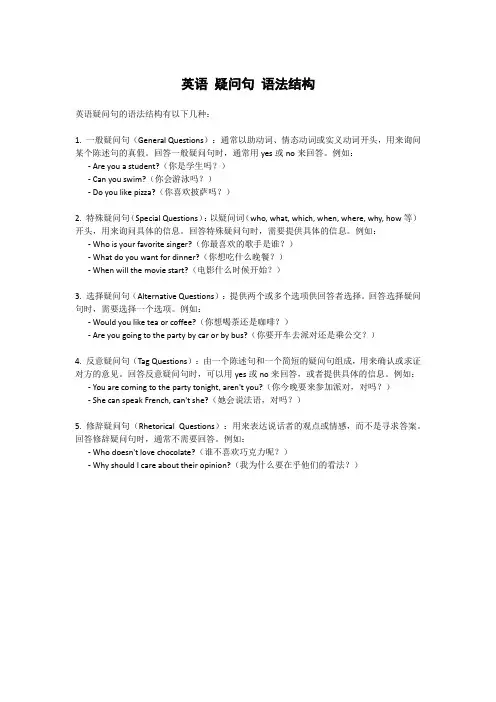
英语疑问句语法结构英语疑问句的语法结构有以下几种:1. 一般疑问句(General Questions):通常以助动词、情态动词或实义动词开头,用来询问某个陈述句的真假。
回答一般疑问句时,通常用yes或no来回答。
例如:- Are you a student?(你是学生吗?)- Can you swim?(你会游泳吗?)- Do you like pizza?(你喜欢披萨吗?)2. 特殊疑问句(Special Questions):以疑问词(who, what, which, when, where, why, how等)开头,用来询问具体的信息。
回答特殊疑问句时,需要提供具体的信息。
例如:- Who is your favorite singer?(你最喜欢的歌手是谁?)- What do you want for dinner?(你想吃什么晚餐?)- When will the movie start?(电影什么时候开始?)3. 选择疑问句(Alternative Questions):提供两个或多个选项供回答者选择。
回答选择疑问句时,需要选择一个选项。
例如:- Would you like tea or coffee?(你想喝茶还是咖啡?)- Are you going to the party by car or by bus?(你要开车去派对还是乘公交?)4. 反意疑问句(Tag Questions):由一个陈述句和一个简短的疑问句组成,用来确认或求证对方的意见。
回答反意疑问句时,可以用yes或no来回答,或者提供具体的信息。
例如:- You are coming to the party tonight, aren't you?(你今晚要来参加派对,对吗?)- She can speak French, can't she?(她会说法语,对吗?)5. 修辞疑问句(Rhetorical Questions):用来表达说话者的观点或情感,而不是寻求答案。
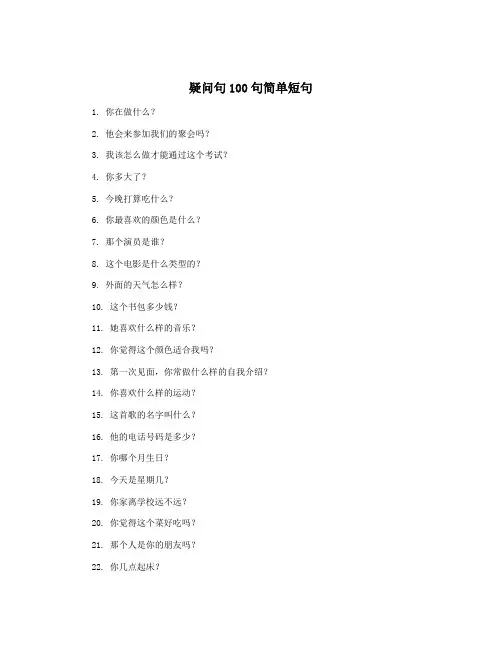
疑问句100句简单短句1. 你在做什么?2. 他会来参加我们的聚会吗?3. 我该怎么做才能通过这个考试?4. 你多大了?5. 今晚打算吃什么?6. 你最喜欢的颜色是什么?7. 那个演员是谁?8. 这个电影是什么类型的?9. 外面的天气怎么样?10. 这个书包多少钱?11. 她喜欢什么样的音乐?12. 你觉得这个颜色适合我吗?13. 第一次见面,你常做什么样的自我介绍?14. 你喜欢什么样的运动?15. 这首歌的名字叫什么?16. 他的电话号码是多少?17. 你哪个月生日?18. 今天是星期几?19. 你家离学校远不远?20. 你觉得这个菜好吃吗?21. 那个人是你的朋友吗?22. 你几点起床?23. 你为什么要学习中文?24. 你觉得明天会下雨吗?25. 你最喜欢的书是什么?26. 你对这个新闻有什么看法?27. 他怎么了?28. 你想要什么礼物?29. 这个地方是哪里?30. 你觉得这个问题难吗?31. 你擅长什么?32. 你最喜欢的电影是什么?33. 你计划怎样度过这个周末?34. 你为什么要辞职?35. 你听过这个歌手的歌吗?36. 这种药有没有副作用?37. 你有没有看过这个电视节目?38. 你觉得这张照片好看吗?39. 你喜欢旅游吗?40. 你可以帮我做这件事吗?41. 这里有没有停车场?42. 你们公司的产品质量怎么样?43. 你常常怎样放松自己?44. 你的兴趣爱好是什么?45. 你想和我一起去看电影吗?46. 你的家人都住在哪里?47. 这个地方的交通怎样?48. 你的梦想是什么?49. 你觉得这个饭店好吃吗?50. 你喜欢喝咖啡还是茶?51. 你最喜欢的季节是什么?52. 这个城市人口多吗?53. 你觉得这个网站可信吗?54. 你觉得这个手机好用吗?55. 你最近看到过什么好电影吗?56. 你觉得这个城市的环境怎样?57. 这个市场开门时间是几点?58. 你觉得这个节目好看吗?59. 你希望下一个假期去哪里玩?60. 你觉得自己的英文水平怎样?61. 你认为这个学校怎样?62. 你们公司的福利怎样?63. 你觉得这篇文章写得好吗?64. 你觉得这所医院怎样?65. 你想做什么工作?66. 你对你的未来有什么规划?67. 这个项目需要多长时间才能完成?68. 你觉得这个节日重要吗?69. 你认为这个商品值得购买吗?70. 你觉得这个城市的气候怎样?71. 你最喜欢的动物是什么?72. 你听说过这个公司吗?73. 你觉得这个电视台的新闻可信吗?74. 你觉得这个问题重要吗?75. 你觉得这个国家的文化怎样?76. 你想了解哪个国家的文化?77. 你觉得孩子应该怎样教育?78. 你习惯什么样的生活方式?79. 你喜欢吃什么水果?80. 你觉得这个节目有趣吗?81. 你认为这个产品有销路吗?82. 你觉得这个教练好吗?83. 你认为这个课程难吗?84. 你觉得这个城市的治安怎样?85. 你觉得这个景点值得一游吗?86. 你觉得这个电影院怎样?87. 你认为这个事情应该怎样解决?88. 你觉得这个美食节好吃吗?89. 你家附近有什么好吃的?90. 你觉得这个酒店怎样?91. 你认为这个社区怎样?92. 你的工作有没有压力?93. 你对这个话题有什么看法?94. 你觉得这个网站好用吗?95. 你认为这个问题怎样解决?96. 你觉得这个人有没有做错事?97. 你最喜欢的食物是什么?98. 你认识这个人吗?99. 你觉得这个家庭好吗?100. 你想和我一起去旅游吗?。
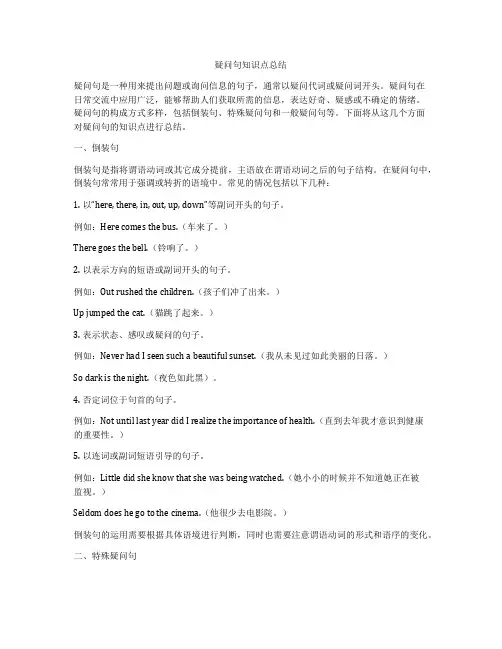
疑问句知识点总结疑问句是一种用来提出问题或询问信息的句子,通常以疑问代词或疑问词开头。
疑问句在日常交流中应用广泛,能够帮助人们获取所需的信息,表达好奇、疑惑或不确定的情绪。
疑问句的构成方式多样,包括倒装句、特殊疑问句和一般疑问句等。
下面将从这几个方面对疑问句的知识点进行总结。
一、倒装句倒装句是指将谓语动词或其它成分提前,主语放在谓语动词之后的句子结构。
在疑问句中,倒装句常常用于强调或转折的语境中。
常见的情况包括以下几种:1. 以“here, there, in, out, up, down”等副词开头的句子。
例如:Here comes the bus.(车来了。
)There goes the bell.(铃响了。
)2. 以表示方向的短语或副词开头的句子。
例如:Out rushed the children.(孩子们冲了出来。
)Up jumped the cat.(猫跳了起来。
)3. 表示状态、感叹或疑问的句子。
例如:Never had I seen such a beautiful sunset.(我从未见过如此美丽的日落。
)So dark is the night.(夜色如此黑)。
4. 否定词位于句首的句子。
例如:Not until last year did I realize the importance of health.(直到去年我才意识到健康的重要性。
)5. 以连词或副词短语引导的句子。
例如:Little did she know that she was being watched.(她小小的时候并不知道她正在被监视。
)Seldom does he go to the cinema.(他很少去电影院。
)倒装句的运用需要根据具体语境进行判断,同时也需要注意谓语动词的形式和语序的变化。
二、特殊疑问句特殊疑问句是以特殊疑问词开头的问句,用以询问特定信息。
特殊疑问词包括what, where, when, why, who, how等。
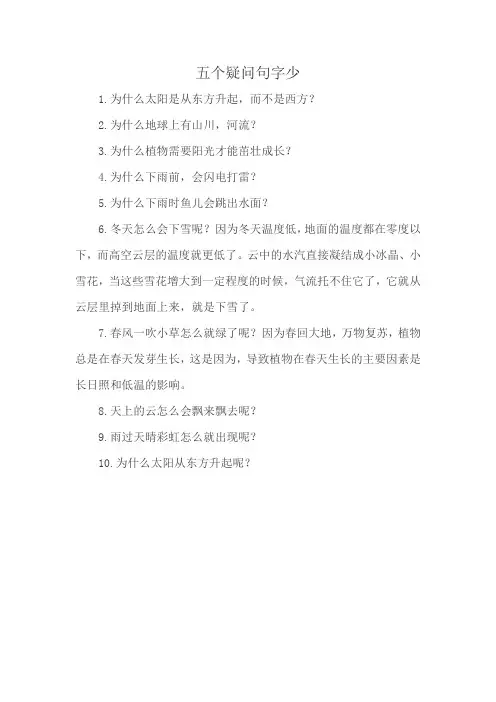
五个疑问句字少
1.为什么太阳是从东方升起,而不是西方?
2.为什么地球上有山川,河流?
3.为什么植物需要阳光才能茁壮成长?
4.为什么下雨前,会闪电打雷?
5.为什么下雨时鱼儿会跳出水面?
6.冬天怎么会下雪呢?因为冬天温度低,地面的温度都在零度以下,而高空云层的温度就更低了。
云中的水汽直接凝结成小冰晶、小雪花,当这些雪花增大到一定程度的时候,气流托不住它了,它就从云层里掉到地面上来,就是下雪了。
7.春风一吹小草怎么就绿了呢?因为春回大地,万物复苏,植物总是在春天发芽生长,这是因为,导致植物在春天生长的主要因素是长日照和低温的影响。
8.天上的云怎么会飘来飘去呢?
9.雨过天晴彩虹怎么就出现呢?
10.为什么太阳从东方升起呢?。
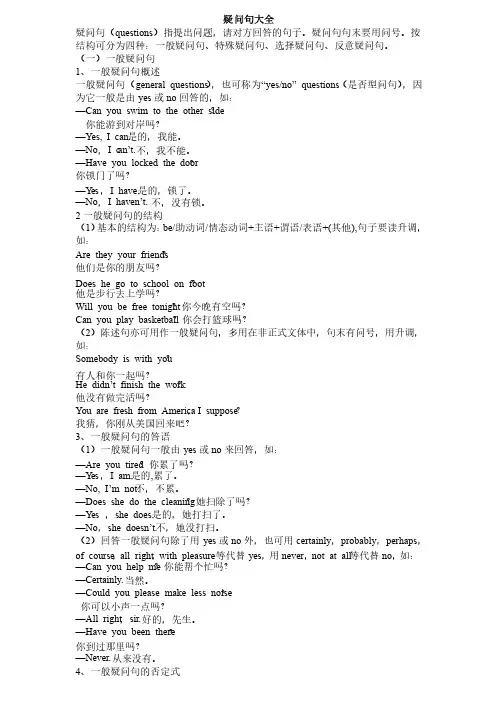
疑问句大全疑问句(questions)指提出问题,请对方回答的句子。
疑问句句末要用问号。
按结构可分为四种:一般疑问句、特殊疑问句、选择疑问句、反意疑问句。
(一)一般疑问句(一)一般疑问句1、一般疑问句概述 一般疑问句(general questions),也可称为“yes/no” questions(是否型问句),因为它一般是由yes或no回答的,如: —Can you swim to the other side 你能游到对岸吗?你能游到对岸吗? —Yes, I can.是的,我能。
是的,我能。
—No,I c an’t.不,我不能。
—Have you locked the door? 你锁门了吗? —Y es,I have.是的,锁了。
是的,锁了。
—No,I haven’t. 不,没有锁。
2一般疑问句的结构 (1)基本的结构为:be/助动词/情态动词+主语+谓语/表语+(其他),句子要读升调,如: Are they your friends? 他们是你的朋友吗? Does he go to school on foot? 他是步行去上学吗? Will you be free tonight?你今晚有空吗? Can you play basketball?你会打篮球吗? (2)陈述句亦可用作一般疑问句,多用在非正式文体中,句末有问号,用升调,如: Somebody is with you? 有人和你一起吗? He didn’t finish the work? 他没有做完活吗? You are fresh from America,I suppose? 我猜,你刚从美国回来吧? 3、一般疑问句的答语 (1)一般疑问句一般由yes或no来回答,如: —Are you tired你累了吗??你累了吗? —Y es,I am.是的是的,累了。
—No, I’m not.不,不累。
—Does she do the cleaning?她扫除了吗? —Y es ,she does.是的,她打扫了。
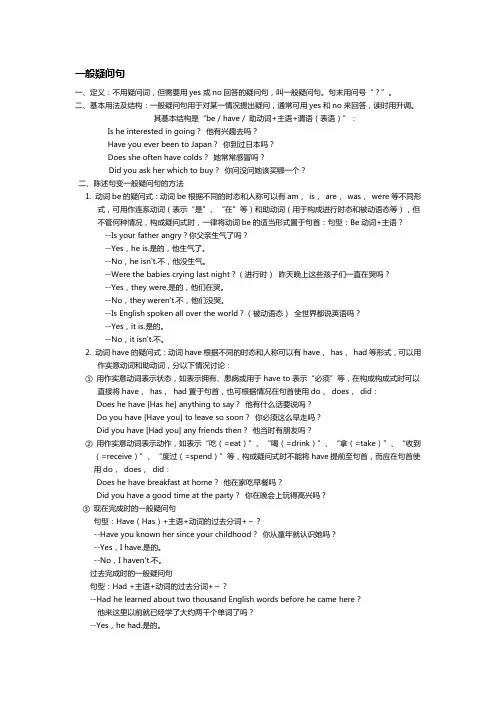
一般疑问句一、定义:不用疑问词,但需要用yes或no回答的疑问句,叫一般疑问句。
句末用问号“?”。
二、基本用法及结构:一般疑问句用于对某一情况提出疑问,通常可用yes和no来回答,读时用升调。
其基本结构是“be / have / 助动词+主语+谓语(表语)”:Is he interested in going?他有兴趣去吗?Have you ever been to Japan?你到过日本吗?Does she often have colds?她常常感冒吗?Did you ask her which to buy?你问没问她该买哪一个?二、陈述句变一般疑问句的方法1. 动词be的疑问式:动词be根据不同的时态和人称可以有am,is,are,was,were等不同形式,可用作连系动词(表示“是”、“在”等)和助动词(用于构成进行时态和被动语态等),但不管何种情况,构成疑问式时,一律将动词be的适当形式置于句首:句型:Be动词+主语?--Is your father angry?你父亲生气了吗?--Yes,he is.是的,他生气了。
--No,he isn't.不,他没生气。
--Were the babies crying last night?(进行时)昨天晚上这些孩子们一直在哭吗?--Yes,they were.是的,他们在哭。
--No,they weren't.不,他们没哭。
--Is English spoken all over the world?(被动语态)全世界都说英语吗?--Yes,it is.是的。
--No,it isn't.不。
2. 动词have的疑问式:动词have根据不同的时态和人称可以有have,has,had等形式,可以用作实意动词和助动词,分以下情况讨论:①用作实意动词表示状态,如表示拥有、患病或用于have to表示“必须”等,在构成构成式时可以直接将have,has,had置于句首,也可根据情况在句首使用do,does,did:Does he have [Has he] anything to say?他有什么话要说吗?Do you have [Have you] to leave so soon?你必须这么早走吗?Did you have [Had you] any friends then?他当时有朋友吗?②用作实意动词表示动作,如表示“吃(=eat)”、“喝(=drink)”、“拿(=take)”、“收到(=receive)”、“度过(=spend)”等,构成疑问式时不能将have提前至句首,而应在句首使用do,does,did:Does he have breakfast at home?他在家吃早餐吗?Did you have a good time at the party?你在晚会上玩得高兴吗?③现在完成时的一般疑问句句型:Have(Has)+主语+动词的过去分词+~?--Have you known her since your childhood?你从童年就认识她吗?--Yes,I have.是的。
疑问句的构成与回答疑问句是用来提问的句子,通过疑问句可以获取信息、确认事实、征求意见等。
疑问句的构成和回答方式,对于语言交流十分重要。
本文将探讨疑问句的构成及几种常见的回答方式。
一、疑问句的构成疑问句的构成需要注意以下几个要素:疑问词、助动词、主语和谓语动词形式。
1. 疑问词疑问词是构成疑问句的关键,它用来引导提问的对象或者范围。
常见的疑问词有:谁(who)、什么(what)、哪里(where)、为什么(why)、何时(when)、怎么样(how)等。
例如:- 你在做什么?- 他在哪里?- 你为什么生气了?2. 助动词助动词用来帮助构成疑问句的语法结构。
常见的助动词有:do、does、did、can、could、may、might、will、would、should、must等。
例如:- 他喜欢吃苹果吗?- 他们会游泳吗?3. 主语和谓语动词形式疑问句的主语和谓语动词形式可能会有变化,具体取决于句子的时态、人称和单复数等。
例如:- 你去了图书馆吗?(一般过去时)- 他喜欢吃苹果吗?(单数第三人称)- 他们会游泳吗?(复数形式)二、疑问句的回答对于疑问句的回答方式可以有多种形式,具体取决于问句的类型和问句的语气。
1. Yes或No回答当疑问句是以肯定或否定形式提问时,可以用Yes或No直接回答。
例如:- 你喜欢苹果吗?- 是的,我喜欢。
- 不,我不会。
2. 直接回答有些疑问句需要用具体的信息或者事实来回答。
例如:- 你是哪里人?- 我是北京人。
- 你什么时候回家?- 明天下午回家。
3. 选择回答对于一些选择性的疑问句,回答时可以给出多个选项供对方选择。
例如:- 你想喝茶还是咖啡?- 我想喝茶。
- 你愿意去哪个城市旅行?- 我愿意去巴黎或者东京。
4. 补充回答在回答疑问句时,有时候需要进行补充说明或者提供更详细的信息。
例如:- 你有兄弟姐妹吗?- 是的,我有一个哥哥和一个妹妹。
- 你喜欢阅读吗?- 是的,我喜欢阅读各种类型的书籍,特别是小说和历史类的。
疑问句英语语法详解在英语语法中,疑问句是一种表达疑问、询问信息的句子类型。
以下是关于疑问句的各个方面,包括疑问词的用法、疑问句的语序、语气、回答方式、省略形式、倒装形式、强调形式、否定形式、附加问句以及修辞手法的详细解释。
1. 疑问词的用法疑问词是用于构成疑问句的词语,常见的有what、who、where、when、why、how等。
它们通常位于句首,引导疑问句。
2. 疑问句的语序疑问句的语序通常与陈述句的语序不同。
在疑问句中,疑问词通常位于主语之前,谓语之后。
例如:What time does the train leave?(火车什么时候离开?)3. 疑问句的语气疑问句可以表达不同的语气,包括陈述、惊讶、疑惑等。
这些语气可以通过动词的形式(如一般现在时、过去时等)和表达方式(如疑问词的位置)来体现。
4. 疑问句的回答方式对于疑问句的回答,通常需要针对问题中的疑问词进行回答。
例如,对于问题"What is your name?"(你叫什么名字?),回答可以是"My name is John."(我的名字是约翰。
)5. 疑问句的省略形式在口语或非正式写作中,有时可以使用省略形式的问题句。
例如,"Where to?"(去哪里?)就是一个省略了主语的疑问句。
6. 疑问句的倒装形式在一些情况下,为了强调某些信息或者达到特定的修辞效果,疑问句可以采用倒装的形式。
例如,"Here is the book!"(这本书在这里!)是一个倒装形式的疑问句,强调了书的位置。
7. 疑问句的强调形式可以通过使用特殊疑问词或者通过改变语序来强调疑问句中的特定信息。
例如,"Why do you like that movie?"(你为什么喜欢那部电影?)通过使用why这个特殊疑问词来强调喜欢的原因。
8. 疑问句的否定形式疑问句也可以有否定形式,通常是在助动词之前加上not。
疑问句有三类七种一、有疑而问(特指问、选择问、正反问、是非问)二、无疑而问(设问、反问)三、猜测而问。
1、是非问句是非问句是提出问题,要求别人回答“是”或“否”的疑问句。
是非问句与一般陈述句的结构形式基本相同,但语调要变为升调,或者句末加上疑问语气词。
是非问句中经常使用的疑问语气词有“吗、吧、啊”等,但不能使用“呢”。
例:(1)他们在上课?(2)他并不知道?(3)今年是建校三十周年?(4)你叫他把那桌子搬到外面去?(5)不准抽烟?(6))张明去了内蒙古草原吗?回答时可以只用“是”、“不是”或点头、摇头来回答。
2、特指问句特指问句是用疑问代词代替未知的部分进行提问,要求对方针对未知的部分做出回答的疑问句。
特指问句既可以使用升调,也可以使用降调。
特指问句只能使用“呢、啊”等语气词,不能使用“吗、吧”。
例:你们这儿的负责人是谁?你们这儿的负责人是谁呢?你们这儿的负责人是谁啊?3、选择问句选择问句是提出两种或两种以上的情况,让对方从中进行选择的疑问句。
选择问句经常使用“A还是B”、“是A还是B”等固有格式。
使用疑问词时,选择问句常用“呢”,一般不用“吗、啊、吧”。
例:今天的体育课打球还是跳远呢?4、正反问句正反问句使用肯定和否定叠和的方式进行提问,希望对方从肯定和否定的内容中做出选择的疑问句。
正反问句一般不使用疑问代词或疑问语气词。
需要时可用“呢、啊”,一般不用“吗、吧”。
例:杜安知道不知道这件事?5、反问句反问句:就是把答案藏在问题里,且答案是唯一的,也是肯定的。
反问句结尾时正常用问号,而有些特殊的句子也可一用感叹号。
(2))我有这么笨吗?----说话者在强调自己并不笨。
(3)难道数学真的这么难么?---说话者在强调数学不难。
(4)那什么是一样的呢?---说话者在强调那是不一样的。
(5)难道我们能浪费时间吗?——强调要珍惜时间(6)你们怎能破坏环境呢? ——强调要保护环境6、设问句自问自答例:(1)这瓶可乐是谁买的?哦,原来是妈妈买的。
一般疑问句20个例句英语1. Do you like coffee?你喜欢咖啡吗?2. Is she coming to the party?她会来参加聚会吗?3. Are they playing soccer in the park?他们在公园里踢足球吗?4. Can you help me with this problem?你能帮我解决这个问题吗?5. Will it rain tomorrow?明天会下雨吗?6. Have you seen my keys?你见过我的钥匙吗?7. Did he finish his homework?他完成作业了吗?8. Is it your birthday today?今天是你的生日吗?9. Are you going to the concert tonight?你今晚要去听音乐会吗?10. Would you like some dessert?你想要些甜点吗?11. Do they live nearby?他们住在附近吗?12. Is this the right way to the station?这是去车站的正确路吗?13. Can she speak French?她会说法语吗?14. Are we meeting at 6 PM?我们下午6点见面吗?15. Will you join us for dinner?你会和我们一起吃晚餐吗?16. Have you read this book?你读过这本书吗?17. Did they travel abroad last year?他们去年出国旅行了吗?18. Is he a good singer?他是个好歌手吗?19. Are you feeling okay?你感觉好吗?20. Can I borrow your pen?我可以借你的笔吗?。
英语中的疑问句疑问句主要用来提问。
根据其语法结构和交际功能,可以分为以下四种类型:一般疑问句、特殊疑问句、选择疑问句和歧义疑问句。
Are you a fireman? 你是一名消防员吗?(一般疑问句)What do you do at the weekend? 你周末干什么? (特殊疑问句)Would you like to have rice or noodles? 你喜欢吃米饭还是面条? (选择疑问句)He is a Chinese teacher, isn't he? 他是一名汉语老师,不是吗?(反意疑问句)一、一般疑问句(yes-no question)一般疑问句通常用来询问一件事情或一种情况是否属实,其回答通常是 yes 或 no,因此这类问句又叫做“是非问句”1、肯定提问Is there something wrong with this machine? 这台机器有问题吗Have you got today's milk? 你拿到今天的牛奶了吗Shall we go on? 我们继续向前吗Must I finish my work on time? 我必须按时完成我的工作吗Can you speak French? 你会说法语吗Would you like me to interpret for you? 要不要我帮你翻译Do you have a smaller size? 你有小一点的尺寸吗Does Susan speak English? 苏珊讲英语吗Did you mom go shopping last weekend? 你妈妈上个周末去买东西了吗2、否定提问Will he not agree with you? 他不同意你吗Haven't you any sisters? 你没有姐妹吗Don't you like this movie? 你不喜欢这部电影吗Can't we go together? 我们不能一起去吗Won't you sit down? 你不想坐下吗Hasn't she been up to the mark lately? 最近她一直感到不太舒服吗3、回答Will you agree with us to e here? 你同意我们来这里吗Yes, we will. 是的,我们会 | No, we won't. 不,我们不会Have got today's newspaper? 你有今天的报纸吗Yes, I have. 是的,有 | No, I haven't. 不,没有Can't he afford a new house? 他买不起新房吗Yes, he can. 不,他能 | No, he can't. 是的,他不能二、特殊疑问句(special question)特殊疑问句是对句中的某一部分提出疑问,通常以 who、where、when、why等疑问词开头,因此又叫“wh-问句”1、疑问代词疑问代词:who、whom、whose、which、whatWho are you? 你是谁Whom are you going to play table tennis this afternoon? 今天下午你和谁打乒乓球Whose glasses are broken? 谁的眼镜打碎了Which shoes do you like? 你喜欢哪双鞋子What do they want to do? 他们想要做什么2、疑问副词疑问副词:when、where、why、howWhen does she want to practice? 她想要什么时候练习Where is the restroom? 洗手间在哪里Why did you leave? 你为什么离开了How do you study English? 你怎么学习英语3、how 构成的短语how 构成的短语:how about = what about 怎么样、how many times 多少次、how do you say... 你怎么说、how are you 普通问好、how many/much 多少、how old 多大年纪、how far 多远、how often 多久一次、 how long 多久、how soon 多久以后等How about bringing some ice cream? 带一些冰激凌怎么样How do you say this word in English? 你怎么用英语说这个单词Howare you? how are you 只是普通问好的方式。
疑问句构成方法疑问句是一种常见的语言表达方式,通常用于询问信息、寻求答案或引起对话的兴趣。
构成疑问句需要注意一些语法规则和句法结构。
本文将探讨疑问句的构成方法,并提供一些例子来帮助读者理解。
一、疑问句基本结构:疑问句通常由一个助动词或疑问词引导,并以谓语动词开头。
根据所使用的助动词或疑问词的不同,疑问句可以分为以下几种类型。
1. 一般疑问句:一般疑问句是最基本的疑问句形式,通常由助动词或be动词引导。
助动词使用原形,be动词根据主语的人称和数的变化进行调整。
例如:- Do you like coffee?(你喜欢咖啡吗?)- Is she coming to the party?(她会来参加派对吗?)2. 特殊疑问句:特殊疑问句用来询问特定信息,通常以疑问词引导。
常见的疑问词包括who, what, when, where, why, how等。
例如:- What is your favorite color?(你最喜欢的颜色是什么?)- When did they arrive?(他们什么时候到达的?)3. 倒装疑问句:倒装疑问句在句子结构上与正常陈述句相反,谓语动词位于主语之前,同时需要使用助动词do或be。
倒装疑问句常用于对前面的陈述进行确认或提供选择。
例如:- You can swim, can't you?(你会游泳,对吗?)- He is from Australia, isn't he?(他来自澳大利亚,对吗?)二、疑问词的使用:不同的疑问词用于询问不同类型的信息。
以下是常见的疑问词及其用法。
1. Who:用于询问人物身份、职业、姓名等。
例如:- Who is that girl?- Who is the president of the company?2. What:用于询问事物名称、性质、情况等。
例如:- What is your favorite book?- What time is it?3. When:用于询问时间、日期或事件发生的时间。
疑问句疑问句(interrogative sentence)用来提出问题,句末须用问号。
疑问句分为一般疑问句、特殊疑问句、反意疑问句和选择疑问句。
1、一般疑问句(1)概述一般疑问句(general question)用来询问一件事情或一个情况是否属实,需要用肯定词yes或否定词no来回答。
-Hasn't he passed the final examination?期末他没有及格吗?-Yes, he has. 不,他及格了。
-Are you a teacher?你是老师吗?-No, I’m not.不,我不是。
(2)基本结构“be、have、助动词或情态动词+主语+谓语”-Are you good at sailing? 你赛艇很行吧?-Yes,in fact, I'm on our city team.是的,事实上,我是市赛艇队的。
Do you remember one afternoon ten years ago when I came to your house and borrowed a necklace of yours? 10年前的一个下午,我到你家借过一条项链,你还记得吗?(3)否定疑问句在一般疑问句的否定结构中,not放在主语之后,也常用缩略式,即将-n't和句首的be、have、助动词或情态动词连在一起。
一般疑问句的否定结构往往用来表示提问人的惊讶、怀疑、邀请、赞叹等,回答时,yes后接肯定结构,no后接否定结构。
Isn't it easier to stay in the same place? 留在原地难道不更舒服一些吗?Haven't you heard of him? 难道你没听说过他吗?Can't you just wear a flower instead? 难道不可以就戴朵花吗?- Didn't he come to see you yesterday?他昨天没有去看你吗?-No, he didn't.是的,他没来。
(4)可以不用yes和no回答的一般疑问句一般疑问句通常情况下用yes、no来回答,但在很多情况下需根据具体情况用其它答语,如certainly、of course、all right、not at all、perhaps、never,no way等。
①回答介意与否-Would you mind if I open the window?我开开窗户你介意吗?-Not at tall. (Certainly not!, Of course not)不介意。
- I’m sorry but I would. It’s could outside.对不起我介意,外面太冷了。
②拒绝或不能给予满意回答而表示道歉-Could you come to the party this evening?你晚上能来参加完会吗?-I’d love to, but you see I’m too busy.我愿意去,但我太忙了。
- That’s very kind of you, but I’m afraid I can’t.你真好,到我恐怕去不了。
-Can you return the book in two days?你两天能还书吗?-Sorry, but I can return it in four days.对不起,但我四天后能还。
-Is he a proper person for the job?他是干这项工作的合适人选吗?- I don’t think so.我不这样想。
③接受邀请或要求-will you send her a note for me ?你代我把这个纸条给她好吗?- I’d be glad to.乐意效劳。
-May I look at the picture?我看看照片可以吗?-Certainly. Here you are.当然。
给你。
④回答带有责备意味的句子-Do you remember what I told you before?我以前告诉你的话你还记得吗? - I’m sorry, sir.对不起先生。
—I think you should phone Jenny and say sorry to her.我认为你该打电话给珍妮并向他道歉。
—No way. It was her fault.决不,那不是我的错。
⑤对提问作出主观判断-Are the shoes too big?这双鞋太大吧?-I think they are all right.我看正合适。
-Is anything the matter? 出了什么事吗?-Of course. 当然了。
-Will he lend me some money? 他会把钱借给我吗?- Certainly not!当然不会!⑥对提出问题的不能确定-Who’s taken my pen?谁把握的钢笔拿走了?-Let me see. Ah, it’s Tom.我想想。
奥,是汤姆。
2、特殊疑问句(1)概述特殊疑问句(special question)是用来对句子某一部分提问的疑问句,以疑问词开头。
How shall I do it? 我怎样做呢?What time will you come?你什么时候来?When will we leave?我们什么时候离开?Where are you from? 你从什么地方来?Who else's raincoat can this be?这还可能是其他什么人的雨衣呢?Which do you want? 你要哪个?(2)种类疑问词分为两种:疑问代词和疑问副词。
①疑问代词构成的特殊疑问句疑问代词who 谁(主格),whom谁(宾格),whose谁的,what什么,which 哪个,用来对主语、宾语、表语、定语、补语等提问。
What will the money be used for? 资金用在什么上面呢?Which speech are you going to listen to this afternoon? 今天下午你打算听哪个报告?Whose is this? 这是谁的?Whose garden do you think looks the nicest? 你觉得谁家的花园最好看?What happened before printing was invented? 在印刷术发明以前是怎样的情况呢?② 疑问副词疑问副词when什么时候,where什么地方,why为什么,how怎样,用来对状语、表语、补语、定语等提问。
-Where are you travelling to, Gary? 加里,你打算去哪儿旅行?-To London.去伦敦。
How long will it take you to complete the trip? 走完全程需要多长时间?How are you getting along with your English lesson? 你学习英语的情况怎么样?When did you last go to the seaside? 你最后一次什么时候去的海边?How many of you are making the trip?你们有多少人参加这次旅行?③which和what用法区别which、what均可与名词连用,来就人或物提出疑问。
当选择余地不大时,一般用which;当选择余地比较大而到底有多少种可能性还不清楚时常用what。
What harm does it do after all? 这到底有什么样的危害?Which parent is more important in the first year of life? 在出生后的第一年,父亲与母亲哪一位更重要?④how与what…like用法区别对人和事物的性质(或持久的特性)提问用“what...like?”;询问变化的事物,如暂时的情况、情绪等用how。
询问天气,用“what…like…?”;问候别人的健康,用how。
-What is your mother like? 你母亲是怎样一个人?-She is a very nice person.她这个人非常好。
How does the boss look this morning?老板早上脸色如何?What's the weather going to be like at the weekend? 周末天气怎么样?-How is he? 他身体怎么样?-He is very well.他很好。
⑤how often与how soon的区别how often询问做某事的频率;how soon询问多长时间以后做某事。
How often do you go there? 你去那的次数如何?How soon can you be ready? 你多久才能准备好?(3)特殊疑问句的语序①陈述句语序疑问词作主语,或者作定语修饰主语,语序与陈述句的语序相同,指对主语进行提问。
What has made this lake so salty? 是什么东西使得湖水这样咸呢?Who gav e you that book?谁给你的那本书?②疑问句语序另一种是“疑问词+一般疑问句”的语序,其中疑问词作宾语、表语、定语或状语。
What did you give her to eat? 你给她吃什么东西?-Why do you want the book so badly? 为什么你这么想要这本书呢?-To study.为了学习。
(4)使用特殊疑问句应注意的几点①Why开头的否定疑问句常表建议或请求Since you have to stay at home, why don't you do some reading? 既然你得待在家里,为什么不读点书呢?Why don't you try this one on?你何不试试这一套呢?②用特殊疑问句表惊奇、愤怒等感情,可用它的强调形式,在疑问词后加ever、on earth、in the world等。
How ever shall we get there? 我们到底如何到那里去?Why on earth was he so nervous? 他到底为什么如此紧张?③特殊疑问句有一些缩略结构How/What about…表建议、请求、邀请、异议或征求对方意见, Why not do ?用于提出建议;why do?表示志文、指责等。